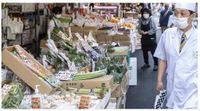Japan's consumer price inflation surged in March 2025, intensifying the dilemma for the Bank of Japan (BOJ) as it navigates its interest rate policies amid rising costs. According to the Ministry of Internal Affairs of Japan, consumer prices, excluding fresh food, rose by 3.2% compared to the same month last year, a notable increase from the 3% recorded in February. This uptick is expected to bolster the BOJ's confidence in its strategy to gradually raise interest rates, as overall inflation has consistently remained above the 2% target for nearly three years.
The core inflation measure, which excludes energy prices, also reflected a significant increase, climbing by 2.9% in March 2025—the fastest rate since March of the previous year. BOJ Governor Kazuo Ueda reiterated the bank's intention to proceed with a cautious approach to interest rate hikes, emphasizing the need to monitor the impact of U.S. tariff measures closely.
Despite government efforts to alleviate the financial burden on consumers through subsidies, price increases have persisted. Service prices saw a modest rise of 1.4% year-on-year, slightly up from 1.3% in February. However, food prices soared by 7.4% compared to the previous year, a slight decrease from the 7.6% increase in February. Alarmingly, the price of rice—the staple food in Japan—skyrocketed by 92.1% year-on-year, marking the steepest increase in data recorded since 1971.
This rapid inflation is particularly concerning as consumer confidence has plummeted to its lowest level in two years, exacerbating worries about the overall economic outlook. Households are increasingly feeling the pinch as the cost of living rises, leading to discussions among lawmakers about potential cash handouts or tax rebates ahead of the expected elections in July.
Amidst these inflationary pressures, the outlook for Japan's economy has darkened, especially following U.S. President Donald Trump's announcement of new tariffs that add further uncertainty to the global economic landscape. The core Consumer Price Index (CPI), which includes oil prices but excludes fresh food, increased by 3.2% in March 2025, in line with market forecasts and higher than February's 3% increase. Core inflation has now exceeded the BOJ's 2% target for three consecutive years, indicating persistent price pressures as companies pass on rising input costs to consumers.
Another inflation index, which excludes fresh food and fuel, also rose to 2.9% in March, up from 2.6% in February. The rising costs are evident across a broad range of goods and services, affecting everything from gasoline and accommodation to chocolate. The rapid increase in rice prices alone, which surged by 92.5% year-on-year in March, poses a significant challenge for households already grappling with increasing living expenses.
Japanese Finance Minister Katsunobu Kato expressed concerns regarding the new U.S. tax measures, stating that they are significantly increasing uncertainty levels. "The recent tax measures from the U.S. are impacting numerous sectors and significantly heightening uncertainty," Kato told Reuters. This statement marked one of the strongest warnings from the Japanese government to date, as both nations engage in trade negotiations.
Kato further noted, "We are deeply concerned that these measures may adversely affect both the Japanese economy and the global economy." The persistent high food prices, combined with rising wages, are keeping consumer inflation above the BOJ's 2% target, reinforcing market expectations that the central bank will continue to raise interest rates from the current level of 0.5%.
However, Trump's tariff plans have caused volatility in global financial markets, raising fears of a potential economic recession and making the BOJ's path to further rate hikes less predictable. Ueda stated on April 17, 2025, that the central bank will continue its course of raising interest rates while also stressing the importance of caution given the increasing economic instability stemming from U.S. tariff policies.
While Washington has announced a 90-day postponement of comprehensive tariffs on imports, it has maintained a 25% tax on aluminum, steel, and automobiles, along with a 10% tax on various other goods. This ongoing uncertainty complicates the BOJ's efforts to stabilize the economy and manage inflation effectively.
In summary, Japan's inflation rate continues to pose significant challenges for the BOJ, as rising prices impact consumer confidence and economic forecasts. With inflation remaining above 3%, policymakers face tough decisions ahead, particularly in light of external pressures from U.S. trade policies. The coming months will be critical as the BOJ navigates these turbulent waters while trying to maintain economic stability.





